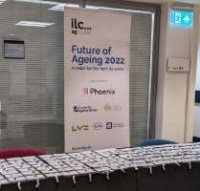A lot has changed since the International Longevity Centre-UK (ILC) was founded by Baroness Sally Greengross in 1997. But how has the way we think about longevity and ageing changed over the past quarter of a century? And more importantly, what might change over the next 25 years? This was the focus of ILC's Future of Ageing conference 2022. ILC's Chief Executive, David Sinclair, chairing the event looked back at 25 years and paid tribute to Sally, who passed away in June 2022.
The past, present and future: What does the data show?
Data plays a crucial role in understanding and addressing the challenges of an ageing population.
Charles Goodhart, Emeritus Professor, Financial Markets Group, LSE, emphasized the importance of global awareness as the demographics of other economies affect us all. He highlighted the impact of China's ageing population and the need for 20% of Japan's declining population to care for older people.
Sir Ian Diamond, the UK's National Statistician, discussed the ageing population's impact on different regions and the need for support and services. He also emphasized the importance of encouraging older people to return to the workforce, citing an ONS study that found 58% of people aged 50-64 would consider returning to work with flexible hours (32%) and good pay (23%) as the most important factors. With the right policies and support, older people are a valuable workforce asset and contribute to the economy.
View session here.
The future of health
Social care expert Richard Humphries noted that care is such a pressing issue due to the success of our longer lives. But our failure to address our social care system over the last quarter of a century means we're storing up trouble.
Stephen Burke, Hallmark Foundation, argued that better care is everybody's business. He pointed out that 25 years have been wasted and the care system is fragmented. He emphasized that people's experiences must be at the heart of shaping the future of care. Georgina Marathefitis, tech UK, quoted "Social care is not only underfunded but is underimagined" and said "technology is the easy bit - we have to empower people to understand how it can complement their lives and make it work for them."
View this session here.
In the UK an estimated 900,000 people are living with dementia, with 52% of people in UK touched by someone living with dementia. Dr. Andy Woodhead spoke about his experience with dementia and the importance of involving those living with dementia in the design of support and care. Fiona Carragher, Alzheimer's Society, and Professor Louise Robinson also argued for better data and much higher diagnosis rates to improve the care provided for those living with dementia. It should not be difficult to provide a seamless service of post-diagnostic support and tailored flexible care coproduced with people with dementia.
View session here.
Stuart McDonald, Head of Longevity and Demographic Insights, LCP, expressed scepticism that the Government's target of five more healthy years by 2035 for all would be met. ILC's Professor Les Mayhew discussed the importance of considering the total benefits of economic output and social improvements with each added year of healthy life expectancy. Preventing all smoking could give us 2.5 of the Government's 5 extra healthy years. George MacGinnis, UKRI, emphasized the need for cross-cutting Government policy and action. Nicola Oliver, Medical Intelligence, argued that future public health programs should start at birth and focus on prevention.
View session here.
The future of work, skills and money
We're living longer, which means we could and should be working for longer. But what does the future of work look like? Are we equipping ourselves with the skills needed? How well are workplaces adapting?
Naomi Clayton, Learning and Work Institute, said more employees need to take part in mid-life MOTs and employers need to provide more skills development and education.
Catherine Foot, Phoenix Insights, argued that carers should be valued for the skills they gain and that more needs to be done to keep them in the workforce.
Professor Simonetta Longhi, Reading University, discussed the need to consider intersectionality in education and skills design. Despite inequalities in labour market outcomes, more women and non-white people had degrees in the labour market in 2022. Professor Louise Haagh, York University, explained one solution to better support our workforce and develop more cohesive levels of activity, upskilling and investment was the introduction of universal basic income.
View session here.
The future of communities. Places, city centres and the high street: How do get we get ageing on the agenda?
Communities give us a sense of belonging, a feeling of playing an active role in society. From the shops that provide our groceries to the parks and public spaces that help us socialise, the high street should work in our favour.
Ailsa Forbes talked about the ILC's Retail Impact project, highlighting how the high street should work for people of all ages.
View session here.
The Greengross Debate on the Future was the last session of the day. ILC's Arunima Himawan was joined by representatives from Hudl Youth Development Agency. They discussed how younger people feel about their own ageing - from rising house prices, changing working lives, saving pressures and climate change - and how we can better plan for the next generation.
View session here.
To conclude
While progress has been made the UK and elsewhere still have much to do to better ensure our ageing populations can thrive.
The conference was made possible with the support of Phoenix, Centre for Ageing Better, Institute and Faculty of Actuaries, LV=, Roche and UKRI.
ILC-UK are already planning Future of Ageing 2023 - so save your place on 7 December 2023 by registering interest via events@ilcuk.org.uk






